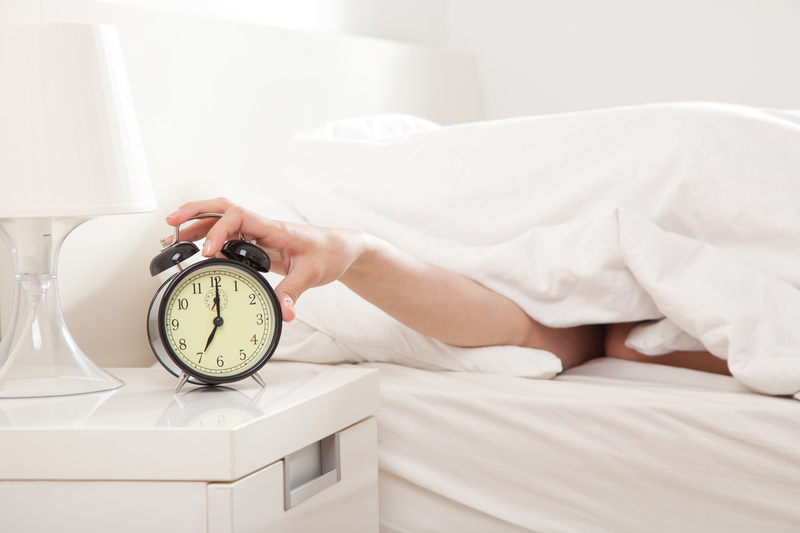Is Too Much Sleep Bad For You? See the Science

So often, we’re told the importance of getting enough sleep. Sleep is a valuable aspect of a healthy, productive life. And there are over a dozen drawbacks of not getting enough—from increased risk of several chronic diseases to just feeling irritable and sluggish. The recommendation for adults between the ages of 18 and 64, in case you don’t remember, is 7 to 9 hours a night. So, we know it’s not good if we don’t get at least 7 hours of sleep, but what if we start oversleeping? What happens when 9 hours turns into 10 or more? Is too much sleep bad for you? Or, is it the luxury many of us dream about?
It turns out that too much sleep, just like too little, can be damaging unless there’s a good reason for it. For example, small children need more sleep, and sometimes, we need to spend some extra time between the sheets to catch up on sleep if, for example, we’ve had a deficit, if we’ve been exercising intensely, if we’re jet lagged, or if we’re suffering or recovering from an illness.
If oversleeping is the norm, though, it could indicate a sleep disorder, such as sleep apnea or narcolepsy. Too much sleep can also contribute to or indicate disturbing health risks.
In today’s article, we will cover the following:
How Is Too Much Sleep Bad for You?
Just as too little sleep is linked with health problems, so is too much sleep. Research indicates too much sleep is associated with a higher risk of:
- Heart disease 1 and stroke 2
- Weight gain 3, 4
- Metabolic problems, including obesity, excess belly fat, high blood pressure, high blood glucose, and high triglycerides levels 5
- Impaired glucose tolerance, which can lead to type 2 diabetes 6,7
- Cognitive issues, like memory problems 8, 9, 10
- Dementia 11
- Depression 12 and other mental issues 13
- Chronic inflammation 14, 15, 16
- Headache 17
- Back pain
- Auto accidents due to fatigue at the wheel
- And early death 18, 19, 20, 21
What is Hypersomnia?
Sleeping too much can also, counterintuitively, make you feel more fatigued and unmotivated! 22
These health issues aren’t associated with the occasional morning of sleeping in—especially if you’ve been sleep deprived. Sleeping in occasionally is normal for everyone. Rather, these types of symptoms occur when oversleeping is chronic or excessive, and the people who suffer find they’re sleepy during the day, even after a full night’s sleep.
The clinical term is “hypersomnia,” which simply means “long sleeping,” and the symptoms of the condition are:
- Sleeping well beyond the typical 7- to 9-hour-per-night norm—requiring up to 10, 12, or even 15 hours of sleep at night to feel your best
- Trouble waking up in the morning, even with an alarm
- Difficulty getting the day started or even crawling out of bed
- Feeling groggy or tired throughout the day
- Difficulty concentrating or feeling like you’re living through a cloud
How Much Sleep is Too Much?
Don’t just grab your stopwatch to make sure you’re getting the required number of hours of sleep. We are all individuals, and we require different amounts of sleep based on:
- Genetic factors. Genetics can influence circadian rhythms and your individual internal sleep drive.
- Age. Your sleep needs change throughout life. Young babies and children as well as teenagers need more sleep than adults, and folks in their late 50s or 60s often need less and may function well with just 6 ½ hours per night.
- Activity level. If you’re exercising intensely, your body needs more time to heal and recover. Often, those who are most active require the most sleep. So, if you’re starting a new exercise plan and find yourself needing more sleep, that’s perfectly normal.
- Health status. Anyone who’s ever been in the midst of fighting off a bad cold or flu or even a minor infection (like a UTI) may have found they needed more sleep. This is true for short-term sickness (e.g., cold or flu) or chronic illness (such as arthritis, anemia, COPD, chronic fatigue syndrome, cancer, etc.).
- Life circumstances. Unusual stress, change, or upheaval can also increase the need for sleep while also making sleep more difficult. It doesn’t need to be negative stress either; a new job, relationship, living arrangement, etc. can all increase the need for sleep. As long as it’s temporary, it shouldn’t pose a problem.
- Personality type. Introverts, for example, tend to need more sleep (or at least rest) than extroverts, especially after being in highly social situations that are overstimulating and exhausting.
- Sleep quality. You may be in bed for a good 8 hours of sleep, but if you’re tossing and turning much of the night, then you’re not getting 8 hours of quality sleep. Your body needs sleep that’s deep and restorative, and if you aren’t getting that because you’re sleeping fitfully, your body could try to keep you in bed for longer.
We spend about one-third of our lives sleeping, so we want to get it right—especially since sleep is as essential to our survival as water and food. It’s also worth noting that doctors don’t really know the cause-effect of oversleeping. Does oversleeping cause the illness, or do people nod off because of a health issue? The full answer isn’t yet known. 23
Is it Oversleeping or a Sleep Disorder?
Sleep disorders can make it harder to sleep but not always. Sometimes they just interfere with the quality of your sleep, thus leading to feeling fatigued or foggy throughout the day.
If you do find you’re sleeping a lot—especially if your symptoms haven’t resolved within 6 weeks—it may indicate a sleep disorder or an underlying health issue, and thus, reason to visit your health-care practitioner (or perhaps even a sleep specialist).
Common causes of sleep disruptors include:
- Narcolepsy, which is when the brain is unable to control sleep-wake cycles. People with this condition can find they’re extremely tired during the day yet unable to sleep at night.
- Restless Leg Syndrome causes the legs to twitch, tingle, or feel like something is crawling on them while trying to sleep. The discomfort often leads people to feeling like they have to urgently move the legs. They can feel overtired during the day simply because it’s difficult to get restful sleep when your legs feel so weird.
- Grinding or clenching your teeth, known as bruxism.
- Sleep apnea, which leads people to stop breathing as they sleep. There are two types of sleep apnea. Central sleep apnea occurs when the brain doesn’t send the proper signals to the muscles for breathing. Meanwhile, obstructive sleep apnea interferes with normal breathing due to upper airway obstruction. Both can be very dangerous conditions that lead not only to excessive tiredness during the day but also to loud snoring, high blood pressure, heart problems (including a higher risk of heart attack, heart disease, stroke, and atrial fibrillation), insulin resistance, type 2 diabetes, metabolic syndrome, weight gain (especially around the waist), complications from medication or surgery, and liver problems.
- Obesity can decrease energy levels and lead to oversleeping.
- Substance use disorders, such as drug and alcohol abuse, can disrupt circadian rhythms, decrease sleep quality, and lead to oversleeping and daytime tiredness.
- If you’re hurt, injured, or sore, it can be difficult to get comfortable and can make a good night’s sleep more elusive.
- When depressed, people tend to sleep more, and when people sleep more, they tend to be depressed. It’s a complex relationship as disrupted sleep both contributes to depression and is a symptom of depression. Depression can also cause insomnia or cycling between insomnia and hypersomnia. Up to 27% of people with depression may suffer from both symptoms together.
Other medical conditions can lead to sleep disruptions or oversleeping, including neurological disorders (e.g., Alzheimer’s disease, Parkinson’s disease, brain injuries, and multiple sclerosis), genetic disorders, anemia, thyroid issues, and epilepsy. Or, oversleeping can be caused by various medications including antihistamines, sedatives, tranquilizers, antidepressants, anti-anxiety medications, antipsychotics, and anticonvulsants.
What to Do When Oversleeping Is Chronic
PLEASE don’t just assume this is normal and that you have to just live with feeling tired during the day and sleeping a lot at night. Oversleeping is often a symptom of a treatable illness, and once treated, your entire life could improve. Take the time to talk with your doctor or health-care practitioner to get to the root of your oversleeping issues. Talk with her or him if you notice that your sleep patterns are changing or if you just feel more fatigued than usual as well.
Also note when you’re burning the candle at both ends and accruing a big slept debt. The body and mind need to sleep and going too long without enough sleep can lead to oversleeping to “catch up”. And these longer sessions can help reduce the risks of not sleeping enough. 24
Yet, irregular sleeping patterns aren’t always good either and lead to what’s referred to as “social jet lag,” which can disrupt the circadian rhythm.
Practicing healthy sleep hygiene instead can help you get into a strong health-promoting sleep routine. Start by:
- Sticking to a consistent bedtime and wake time schedule
- Greet the sun every morning—get outside into the sun for at least 15 minutes within the first hour of waking (if possible)
- Avoid caffeine after 2:00 p.m.
- Avoid alcohol within three hours before bed and cut back in general if you’ve been drinking a lot
- Sip on some herbal tea or warm milk instead of drinking caffeine or alcohol to help you relax in the evenings
- Exercise for at least 20 to 30 minutes per day but avoid intense exercise 2 to 4 hours before bed (a gentle stroll or stretch closer to bedtime, though, may help you sleep)
- Relax before going to bed, turn off any blue-light-emitting devices, and enjoy reading, bathing, or meditation instead
- Set up your room for a good night’s sleep by keeping it cool, avoiding bright lights and sounds, and keeping computers and TVs out of the bedroom and powered off for at least two hours before it’s time to go to sleep
- Use a sleep journal to log when you go to bed, how long it took you to fall asleep, how often you wake up at night, how well you sleep, how you feel when you wake up, and how you felt during the day
If you follow healthy sleep hygiene guidelines, you’ll likely be rewarded with better sleep for greater daytime energy levels, clearer thinking, and increased productivity. Sweet dreams!





 7 Signs Your Body is Seriously Low on Collagen (not just wrinkles)
7 Signs Your Body is Seriously Low on Collagen (not just wrinkles) Health Expert: "Turmeric Doesn't Work (unless...)"
Health Expert: "Turmeric Doesn't Work (unless...)" 3 Warning Signs Your Probiotic Supplement is a Total Waste
3 Warning Signs Your Probiotic Supplement is a Total Waste

